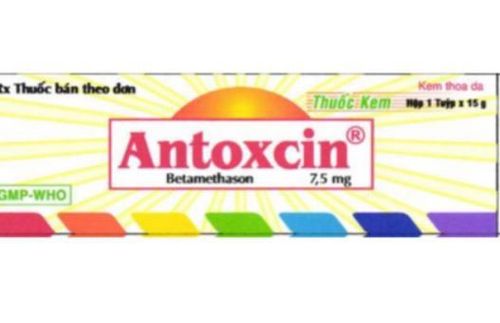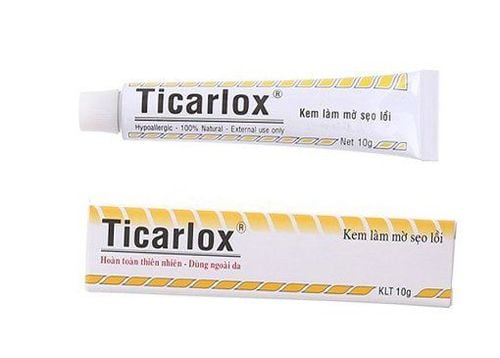This is an automatically translated article.
Metasin drug is made in the form of a topical ointment, with the main ingredient being Betamethasone. Adhering to indications, the dose of Metasin will help patients improve treatment effectiveness and avoid unwanted side effects.
1. What is Metasin?
Drug Metasin is a drug for the treatment of dermatological diseases with the main ingredient being Betamethasone, which is a synthetic corticosteroid. It has a very strong Glucocorticoid effect accompanied by a negligible Mineralocorticoid effect. When used topically, Betamethasone is effective in the treatment of corticosteroid-responsive dermatoses due to its anti-inflammatory, anti-allergic, and vasoconstrictor effects.
The level of absorption of Metasin drug through the skin depends on many factors of skin condition, dressing, excipients in the drug.
Betamethasone in Metasin is easily absorbed when applied topically. When applied, especially when the bandage is closed after applying the drug or the skin is damaged, it will increase the ability to absorb the drug through the skin. There may be a sufficient amount of Betamethasone absorbed to have systemic effects. Betamethasone in Metasin is less widely bound to plasma proteins. After absorption through the skin, Betamethasone in Metasin is metabolized mainly in the liver, then excreted by the kidneys. Metasin is indicated in the following cases:
Relieve inflammatory symptoms in corticosteroid-responsive skin diseases; Localized infiltrative lesions; Hypertrophy of the flat Liken (lichen); Psoriasis rash ; Keloids; Discoid lupus ; Erythema multiforme (Stevens-Johnson syndrome); Exfoliative dermatitis; Contact dermatitis. Metasin is contraindicated in the following cases:
Patients with stable skin lesions caused by viruses, bacteria, fungi, parasites on a large scale. Lesions with ulcers, acne. Hypersensitivity to Betamethasone, other Corticosteroids or to any component of the drug. Notes and precautions when using Metasin:
Patients need to stop taking Metasin if irritation, hypersensitivity or other reactions occur. Metasin can be absorbed causing systemic effects. Therefore, it is necessary to monitor patients during prolonged treatment with Metasin, when using the drug on a large scale, when using the graft technique and when using Metasin for children. Use caution when using Metasin for pregnant women. The benefits and risks of the drug to both mother and fetus need to be weighed. Breastfeeding women should avoid applying Metasin to their breasts while breastfeeding.
2. Dosage and how to use Metasin
Metasin is used by topical application. Dosage of Metasin should be according to the doctor's prescription. The reference dose is to apply the drug 1-2 times a day.
Systemic effects due to Metasin overdose may be encountered such as sodium and water retention, increased appetite, calcium and phosphorus mobilization accompanied by osteoporosis, hyperglycemia...
Management: In case of acute Metasin overdose, patients need to monitor electrolytes in serum and urine. Special attention should be paid to the sodium and potassium balance. In the case of chronic toxicity, Metasin should be discontinued gradually and electrolyte imbalances treated if necessary.
3. Side effects of the drug Metasin
The side effects of Metasin are related to both dose and duration of treatment.
Topical side effects of Metasin include:
Burning sensation; Itchy; Irritation; Folliculitis ; Hirsutism ; acne-like rash; Reduce pigmentation; Secondary infection; Skin atrophy; Skin veins; Allergic dermatitis ; Urticaria; Angioedema. Systemic side effects of Metasin include:
Potassium loss; Sodium retention; Water retention; Irregular menstruation; Cushing's syndrome; Inhibits the growth of the fetus and young child; Reduced glucose tolerance; Muscle weakness, loss of muscle mass; Osteoporosis; Cheery; Mood swings; Severe depression ; Insomnia; Benign intracranial hypertension; Cataract; Glaucoma; Stomach ulcer, bleeding; Pancreatitis; Abdominal distention; Esophageal ulcers. If you find any unusual symptoms appear while using Metasin, you should immediately notify your doctor or go to the nearest medical facility for timely treatment.
4. Interaction of Metasin with other drugs
Betamethasone in Metasin is easily absorbed when used topically and has systemic effects. Therefore, interactions with other drugs can occur, causing:
Increased risk of hepatotoxicity if used together with high doses or long-term paracetamol. Increased blood glucose levels, so dosage adjustment of oral antidiabetic drugs or insulin may be necessary. Increased potential for arrhythmia or toxicity of Digitalis with hypokalemia when used with digitalis glycosides. May potentiate or decrease the anticoagulant effect of Coumarin anticoagulants, so dosage adjustment of the anticoagulant may be necessary. May increase blood levels of salicylates with co-administration. Concomitant use of nonsteroidal anti-inflammatory drugs or alcohol consumption may increase the severity of peptic ulcers. Concomitant use of tricyclic antidepressants may increase corticosteroid-induced psychosis. Using Metasin with Phenytoin, Phenobarbital, rifampicin or ephedrine may increase metabolism and reduce the therapeutic effect of Betamethasone. Estrogen can alter the metabolism and protein binding of Betamethasone in Metasin, reduce clearance, increase the therapeutic effect and increase the toxicity of Betamethasone. Caution should be exercised when aspirin and Metasin are used in combination in case of hypoprothrombinemia. Above is all information about Metasin drug, patients need to carefully read the instructions for use, consult a doctor / pharmacist before using. Absolutely do not arbitrarily buy Metasin at home treatment because there may be unwanted side effects.













